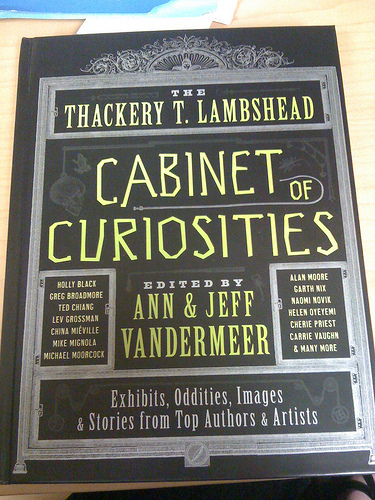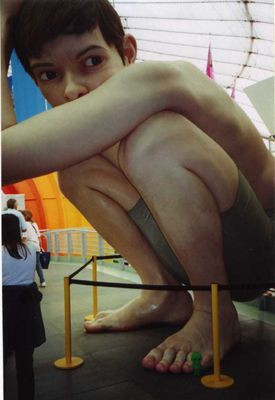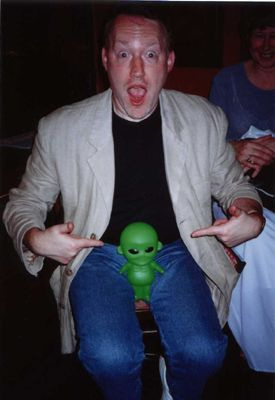Jeff VanderMeer's Blog, page 56
June 22, 2011
Women of the Supernatural: A Tartarus Press Sampler

Our Cheeky Frawg e-book imprint is teaming up with Tartarus Press to bring you Women of the Supernatural: A Tartarus Press Sampler edited by Ray Russell (founder of Tartarus). With any luck, this will be the first of a series of Tartarus samplers around some specific organizing principle—some general and some more specific. This isn't the final TOC as we're still working on some permissions, but gives you a sneak peek.
"The Painter of Dead Women" by Edna Underwood
"Sister Sister" by Angela Slatter
"Afterward" by Edith Wharton
"What the Eye Remembers" by Anne-Sylvie Salzman
"Terminus" by Nina Allen
"Mr Manpferdit" by Tina Rath
"A Were-Wolf of the Campagna" by Mrs Hugh Fraser
"The Cook's Story" by Rosalie Parker
"A Mystery of the Campagna" by Anne Von Degen
Women of the Supernatural: A Tartarus Press Sampler originally appeared on Ecstatic Days on June 22, 2011.
Steampunk in the Classroom: Using the Steampunk Bible as Textbook!

(Copyright Business & Heritage Clarkesville)
To be honest, one thing about doing a book—any book—is that you get tired of talking about it and tired of the book itself real fast, especially if you're involved in creating other projects. And at various times, I know I've confessed to Steampunk fatigue, as have we all, I think.
But I have to share this article about Steampunk as a hands-on college class at Austin Peay, using the Steampunk Bible as the textbook. It's an awesome example of a book having a real-world, concrete impact.
This does happen more often than you might think. Over the years, many of the books I've been involved with have an impact. We're told so often that books don't matter anymore, but in addition to the fiction I write inspiring creators to riff and explore—and vice versa—The New Weird and our Steampunk anthologies (all edited with my wife Ann) have had impact in unexpected places at unexpected times, creating debate and inspiring creators, and even, in some cases of translation, sparking hybrid movements and books. That's always a great feeling—when you can have a positive impact on others.
Steampunk in the Classroom: Using the Steampunk Bible as Textbook! originally appeared on Ecstatic Days on June 22, 2011.
June 21, 2011
Context? Meaning?
The Journals of Doctor Mormeck (Mountain)–Entry #8
Note: Like this serialized long story/novella? Paypal me what you think it's worth to vanderworld at hotmail.com. Donations above $21 will entitle you to a free copy of whatever anthology it eventually appears in, or any initial stand-alone book version.
Summary:
Living on a far-distant planet, Doctor Mormeck works for strange beings that might or might not be angels. Mormeck helps with surveillance experiments conducted across alternate realities, currently focused on a hundred thousand alt-Earths. When an avatar of Mormeck is sent to a war-torn winter city to investigate a mysterious Presence, the doctor will become embroiled a conflict that reaches across time, space, and other dimensions. The story is told from the POV of Mormeck on the planet (Mountain) and the Mormeck in the winter city (avatar/Outpost)
Archive is here Journals of Mormeck and first entry is here.
I was not rid of my avatar once he traveled to the winter city under siege. I thought I might be, and I was glad of this, for he still troubled me. But the angels had their luna moths in the city, and they wanted me to use them for surveillance. "Only you," said Gabriel, "will know what might be odd and what might be normal for your avatar. If your avatar is subverted by the Komodos or a presence, the evidence of this may be imperceptible to anyone else."
So I watched my Outpost performing his mission in the city. First, his disappearance into the soil, which I knew was to acquire the right molecular structure, and then his reappearance as a member of one side in the conflict. I knew where to look, knew the signs, for where he might arise.
In those first moments after he once again registered in the surveillance of the luna moths, my avatar was a stranger to me—more even than when he had stared at me while Seether destroyed him to rebuild him. This sense of something wrong grew stronger. I was here, but I was also there, with no connection between the two. He wasn't my doppelganger or my brother. He was me, but now different. On the one hand there was my sense of loss, of a need to communicate with my avatar. On the other, there was a growing dislike, as if I watched someone else pretending to be me and not behaving as I would behave, but being taken as me by those around him. This feeling was bizarre to have, I know, and yet it seemed encoded in my DNA.
It did not take long, watching him run from shadow to shadow, sometimes hiding in plain sight by joining members of the same army and sometimes leaving them to wander in the most deserted places, that I began to want him dead. My avatar. Me, in a sense. Most of me rebelled against this idea—found it perverse and distressing—but underneath like some constant, distant drum beat, I still had the thought.
By the time he encountered the komodos on the second day, I had become too embedded in the situation, too fixated on my avatar, and it took awhile to realize that within thirty-six hours of my Outpost entering the city, a third of my luna moths had winked out, just disappeared into the snow.
And I had no idea who had done it.
The Journals of Doctor Mormeck (Mountain)–Entry #8 originally appeared on Ecstatic Days on June 21, 2011.




The Thackery T. Lambshead Cabinet of Curiosities–Pre-Pub Reviews

(Our editor, Diana Gill, thoughtfully took a photo of some finished copies they just received at HarperCollins.)
In addition to a great review in Romantic Times and in Fangoria, Bookgasm has just reviewed The Thackery T. Lambshead Cabinet of Curiosities—a full three weeks before the publication date. It gives a nice sneak peek at the book, and really gets what we were trying to do, calling it "amazingly creative and delightful." And, as with any cabinet of curiosities, "This is a book you keep on your nightstand or end table to pick up and dip into every now and then, rather than read from cover-to-cover in a few sittings. But you're likely to find it hard to resist reading more than one entry in any of the various sections once you begin."
I'll cheerily will note, though: this is not a steampunk anthology. It's an antho that contains some stories with steampunk elements, but if you don't like steampunk you'll find that most of the antho isn't related to that subgenre at all.
The Thackery T. Lambshead Cabinet of Curiosities–Pre-Pub Reviews originally appeared on Ecstatic Days on June 21, 2011.




June 20, 2011
Cool Steampunk: Time-Traveling Digital Victims Who Are Just Getting Started…But Really It's All About Balls
Cool Steampunk: Time-Traveling Digital Victims Just Getting Started…But Really It's All About Balls.
Some Addictomatic searches tell little stories! Yay for stories! Especially on USA Today blog and in LA Times.
(Mormeck returns tomorrow.)

Would you buy a clock from this grump?
Cool Steampunk: Time-Traveling Digital Victims Who Are Just Getting Started…But Really It's All About Balls originally appeared on Ecstatic Days on June 20, 2011.
June 19, 2011
Cheeky Frawg Update: Women of the Supernatural, Secret Lives…
Just a short note to say Cheeky Frawg will debut the e-book of my limited edition collection Secret Lives by the end of next week. We have also acquired the e-book reprint anthology Women of the Supernatural: A Tartarus Press Sampler, edited by Ray Russell. Finally, we will be publishing the e-books of John Grant's awesome Corrupted Science: Fraud,Ideology, and Politics in Science, Discarded Science: Ideas That Seemed Good at the Time, and Bogus Science, Or Some People Really Believe These Things. More on these acquisitions and on other titles soon.
Cheeky Frawg Update: Women of the Supernatural, Secret Lives… originally appeared on Ecstatic Days on June 19, 2011.




Evil Monkey's New Religion
Evil Monkey:
I'm starting a new ideology.
Jeff:
Based on what tenets?
Evil Monkey:
Everyone is evil. Everyone is a monkey.
Jeff:
Even aarkvarks?
Evil Monkey:
Even aarkvarks.
Jeff:
Don't do it, dude. Ideologies are toxic.
Evil Monkey:
No they're not—they're the life's blood of social change.
Jeff:
Until they go rogue.
Evil Monkey:
You live under the constraints of a rogue ideology—capitalism.
Jeff:
Capitalism is like the morphine of ideologies. You're going to become so addicted you're going to die, but everything will be so fuzzy around the edges you'll almost enjoy it, if you're selfish enough.
Evil Monkey:
Like a cocoon protecting you from the irrational insanity of your brain.
Jeff:
Um, not exactly. Okay, maybe that's it exactly.
Evil Monkey:
My ideology will be pure, though. It'll only do good. It's been created to do good.
Jeff:
They all start out that way. Most of them. Some of them. Then before you know it you're being pushed forward to defend the Volga by political officers who will later report your every nervous tic to a homicidal dictator and after the war you will probably be sent to die in a work camp despite the medals of valor on your chest.
Evil Monkey:
You're cynical.
Jeff:
No, just brushing up on the Siege of Stalingrad. Do you know even the starlings were converted to an ideology? They converted to the ideology of the Germans. They began to sound like the sound of mortar fire. Mimicry—a key component of ideology. You must have insurgents.
Evil Monkey:
You're not helping. I need some key terms to promote my ideology. Jargon that distinguishes my ideology from others.
Jeff:
What's your ideology?
Evil Monkey:
Everyone should do good deeds and anyone who doesn't do good deeds should be shot. And animals are pets, not meat. Meat should be liberated from its prisons. Wait—I wrote that last bit down wrong. It should've read "Meat is liberal and must be protected."
Jeff:
Are you some kind of mutant Franciscan?
Evil Monkey:
So I thought my terms would be "gooder", "anti-gooder", and "angel."
Jeff:
And am I going to regret asking what those mean?
Evil Monkey:
A "gooder" is someone who is doing good deeds. An "anti-gooder" is someone who is sitting quietly in their house taking up space not doing good deeds. An "angel" is someone who is intrinsically imbued with "gooder" qualities. In other words, even when that person is sitting quietly in their house not doing anything, they are doing good.
Jeff:
That doesn't make sense.
Evil Monkey:
Well, I mean, I've got to be an angel because I'm going to need some downtime and I don't want the neighbors shooting me.
Jeff:
Right.
Evil Monkey:
Anyway, it's a start.
Jeff:
What problem are you trying to solve with your ideology?
Evil Monkey:
People not doing enough good in the world. In fact, most people are actively doing anti-good, possibly from having too much nervous energy.
Jeff:
There will be less people to not do good once you're done, that's for sure.
Evil Monkey:
If I apply these terms in support of my ideology and they catch on, it can become metaphorical to some extent. It's mostly about making people be "gooders" online anyway. So if you're typing on the computer you're a "gooder" even if you don't leave the house. Typing is doing now. Expressing an opinion is a good act.
Jeff:
Apparently. What if your ideology comes up against the realities of the world? Like, the factual precepts of the world?
Evil Monkey:
We will make the world conform to our ideology.
Jeff:
Even gravity? What if gravity turns out to be a force of anti-good?
Evil Monkey:
We will reverse gravity. We will make it gooder. We will make it angel. Gravity shall dance to our tune and use our terms and then we shall send gravity forth to preach the word, and as a new convert it shall be like an annoying but endearing grad student and talk all about how it used to be gravity and evil but now is anti-gravity and anti-evil, and lo!, it shall be so because I, the angel of the gooder movement, believe in it. If I concentrate really, really hard.
Jeff:
So basically anti-science?
Evil Monkey:
I prefer to see it as "pro innovation."
Jeff:
That seems clear. Can I be a neutral-gooder? Like, support your aims but not your means? I would like to see more good in the world. I mean, I've yet to see many people come out in favor of more evil in the world. I do support the idea of good works.
Evil Monkey:
No, in my system you are either a gooder or an anti-gooder. Like you said, who would be against doing good?
Jeff:
What if I want to call it "acts of loving kindness" instead. Could I be a Kindness Purveyor?
Evil Monkey:
Sorry, no. That would be a heresy.
Jeff:
Even though it's the same thing?
Evil Monkey:
Not the same exact word, so not the same thing. You must use the right words or my disciples will not understand what you're talking about and brand you an anti-gooder. You see, my ideology will liberate the individual from the constraints of evil placed upon them by society.
Jeff:
Do anti-gooders get any warning shots?
Evil Monkey:
First they must be accused of being anti-gooders.
Jeff:
Can anyone accuse anyone else of being an anti-gooder?
Evil Monkey:
Sure! We're very democratic.
Jeff:
If someone accuses someone else of being an anti-gooder, do they get a trial?
Evil Monkey:
I thought about trials, but that's too much work. Basically, if you're accused, you're guilty, especially if it's an angel accusing you. And then we shoot you.
Jeff:
Very simple. Utterly. Completely. Simple.
Evil Monkey:
It'll probably make neighbors much more polite to one another! Really, what will happen is more and more people will do good and eventually there will be no anti-gooders and thus no accusations.
Jeff:
What if I just want you to vacate your house so I can buy it cheap?
Evil Monkey:
Now you're being silly.
Jeff:
Are you afraid your ideology mightl obscure the meaning of good? That applied like a straitjacket, your ideology might make it harder to get to the root of all evil? That your ideology might in fact become counterproductive to your aims?
Evil Monkey:
No, it won't. I'm a leftist. I believe in the cause of the gooder.
Jeff:
I hate to break it to you, Evil, because I love you, but you've temporarily become a fundamentalist. Leftists can be fundamentalists, too.
Evil Monkey:
Not true! I've seen both parts of the Che Guevera movie. Well, okay, just the first part and some of the second half. Well, okay, part of the first half. Well, okay, I read a review. Part of a review. I saw a headline. Somebody told me about a headine.
Jeff:
Evil Monkey:
Ow! Why did you do that?!?!
Jeff:
If I want to be a gooder, I've got to do good acts.
Evil Monkey:
That wasn't a good act!
Jeff:
It was from my perspective.
Evil Monkey:
You're not being much help with my ideology. I don't think you're taking this seriously. The world is full of un-good, spilling over with it. You're actively obstructing a gooder from doing good.
Jeff:
I'm temporarily irritating a nutter who wants to form a cult. Now get out of my house before I shoot you.
Evil Monkey:
Okay, okay! Forget I mentioned it. Geez, you're so sensitive these days.
Evil Monkey's New Religion originally appeared on Ecstatic Days on June 19, 2011.




June 18, 2011
The Journals of Doctor Mormeck–Avatar, Entry #1
[image error]
Note: Like this serialized long story/novella? Paypal to vanderworld at hotmail.com. Donations above $21 will entitle you to a free copy of initial anthology or stand-alone book appearance. Context:
Living on a far-distant planet, Doctor Mormeck works for strange beings that might or might not be angels. Mormeck helps conduct surveillance experiments across alternate realities, currently focused on a hundred thousand alt-Earths. When an avatar of Mormeck is sent to a war-torn winter city to investigate a mysterious Presence, the doctor will become embroiled an ever-widening conflict.
Archive is here Journals of Mormeck and first entry is here.
Returned to the winter city usually called Stalingrad but on this alt-Earth known as "Volgograd", Russian, German, and the subsonic language of the Komodos crammed into me. I appeared in a crush of snow, dropping reconstituted through five feet of air with none to see me. I tried to change my molecular structure immediately, but this was impossible. No one was around. Not even a rat. Without hesitation, I shed all but a tendril of myself and runneled into the substrata and found a sluggish worm, became a worm, found a rat, became a rat, tunneled up and found a dead human, thawed that, became that. All the time paranoid, afraid that some Presence might find me. But it didn't happen.
I don't know how long this process took—I was too engrossed in it—but long enough that I had gotten over the aftershocks from being devoured by Seether. There's a horror in being ripped at, being torn apart, that has nothing to do with pain—the pain had been deadened—and everything to do with the pulling, the ripping rendered numb. It felt to me as how it would feel to a human if peeling off the dead skin from a sunburn, but instead, with the same level of intensity, long swathes of flesh came with it. What had the humans felt so long ago when the angels had sent out their holy bears to bring back specimens.
Did those hunted down think that after their savage deaths they had been to Heaven? Did they misinterpret the smiles of the angels?
Not me. I knew I had been brought to a kind of hell. Under siege. On this alt-Earth, the date was December 14, 1942. The Germans and Russians had fought themselves to a stand-still for over a year, and both sides barely existed as coherent fighting forces in the city despite the reflexive sending of more reinforcements and supplies. Air support had become almost non-existent. Trotsky was plagued in the Far East by an all-out Japanese assault upon his borders. Hitler had launched an attack against the East Coast of the country known as the United States, after a failed revolt by his generals, and spending much of his time keeping his supply lines safe and ruling Europe and part of Africa.
This winter city was now forgotten and full of corpses, almost equally divided between the two sides, but poorly ruled. Into that lawlessness had come spies and profiteers and, oddly, an area scooped out of the boundaries near the Volga that now served as a kind of neutral zone. And everywhere, too, the komodos roamed, silent and invisible, their brand of life-taking unnoticed amongst so much carnage.
I became human hidden behind a ruined, frozen wall, hearing the soft crunch of a patrol across an ice field that once been a courtyard, and the sound of mortar shells, and a low clear moan somewhere distant, and a gasoline-blood smell that had soaked into the snow. The shouts of men and women accompanied by machine gun fire. The sun was a blood-orange at the horizon, but it had been that way for hours.
Dusk, and I'd stolen the dead man's clothes, his boots, his gun, and his face. I discovered I was cold but I could freeze through and it wouldn't matter. I was now part of the Russian side: Trotsky's White Army, stalemated with the German Christo-Fascists…the information dissolving into my brain like a painkiller, each new fact bringing me calm. I would always have a map in my head, always know exactly where I was, and thus how far away from home.
Mormeck Mountain rarely knew outright fear, but I was an Outpost—I could as good as die before being saved, and the Mountain would remain if I disappeared to my last cell. From the first, then, in that new and tactile place I found I had become autonomous and through rebirth as worm-rat become my own person. A dead person. I looked like a dead person. I had to.
The dead man had had a name, but I didn't want to know it. I had to know only that he'd been on patrol and a sniper's bullet had taken him, and now he would lurch up and find another patrol or wander, seeking others, seeking a certain…Presence.
But the swift-shifting komodos that found me first.
The Journals of Doctor Mormeck–Avatar, Entry #1 originally appeared on Ecstatic Days on June 19, 2011.




The Journals of Doctor Mormeck (Mountain)–Entry #7
Note: Like this serialized long story/novella? Paypal me what you think it's worth to vanderworld at hotmail.com. Donations above $21 will entitle you to a free copy of whatever anthology it eventually appears in, or any initial stand-alone book version.
Archive: Journals of Mormeck
My kind cannot be killed—extinguished for a time, yes, but the truth of me lives in every cell, and were I ever treated more like a castle-keep than host and stormed and sacked and put to the torch…some small piece of unconquered me would survive, slip into a river, be picked up by the mud on an invader's boot, and over time, centuries perhaps, Mormeck would rise again, mountain-massive.
So when the angels told me I must leave my self in my avatar, sever the connection, exist in two places at once, I was at peace with this situation. But what I had not been told was that this must happen before my Outpost's dissolution by the bear Seether—that it was expected I would observe the beginning of my Outpost's passage to the winter city.
At first, this unexpected thing did not bother me, and I did my duty: I disengaged so that my avatar/Outpost was no longer me and yet we both were me. I, Mormeck Mountain, watched through the sensors in my skin as Mormeck Outpost was torn to pieces by Seether, the bear-door. Watched the busy work of claws and fangs haphazardly reduce me to slashed chunks of flesh, the blood pouring out onto the grass while the angels laughed.
I felt almost superior, reflecting on how mere humans on the whole—the intelligent species we spy on most throughout all the alt-Earths—do not understand their fellow animals. Their endearing but sad attempts at science have never understood that a luna moth is not just Actias luna (Linnaeus), a member of Lepidoptera, but also an intricate surveillance device that can transmit live images, sound, taste, smell, and feel across a million alt-worlds to a remote destination presided over by a living mountain. That a single komodo dragon might exist in multiple realities at once, its skin porous in a way that would be considered supernatural by the primitive. That certain bears might be a horrifically painful but efficient way of travel. Or even, switching to the science of religion, that angels might not just laugh at the human idea of God but cynically seek to reinforce it, too.
But, gradually, I was drawn to the spectacle in front of me. It was a strange sensation to see myself—even such a small part of me—die in such extreme and methodical a fashion without any connection, to not be experiencing it too. I had no time for admiration of Seether's killing efficiency. I was watching instead what should have been the face of pain on Mormeck Outpost, those features smeared with blood, offal, and ripped flesh, cheek ripped from the bone, orbital exposed…and yet still the expression, the eyes, screamed not of horror or discomfort but of release, of freedom, of anticipation…even as the remains sank in on themselves due to Seether's happy gorging and the bear slapped off the head and cracked open the skull, feasted on the brain, cracked the bones, slurped the marrows.
Just the price of passage, and Mormeck Outpost's expression no concern of mine, perhaps even beyond his control. But to me in that moment I thought, with a sense of loss, that he was glad to be rid of me, glad to be gone. And that, dear diary, was a revelation, and Seether only in that minute having licked the last of him off of the grass. A great fear, a great longing, a great envy rose within all of me, like some sort of revolt at the cellular level. For the first time in dealing with the angels, I felt as if I had made a colossal mistake.
The Journals of Doctor Mormeck (Mountain)–Entry #7 originally appeared on Ecstatic Days on June 18, 2011.















